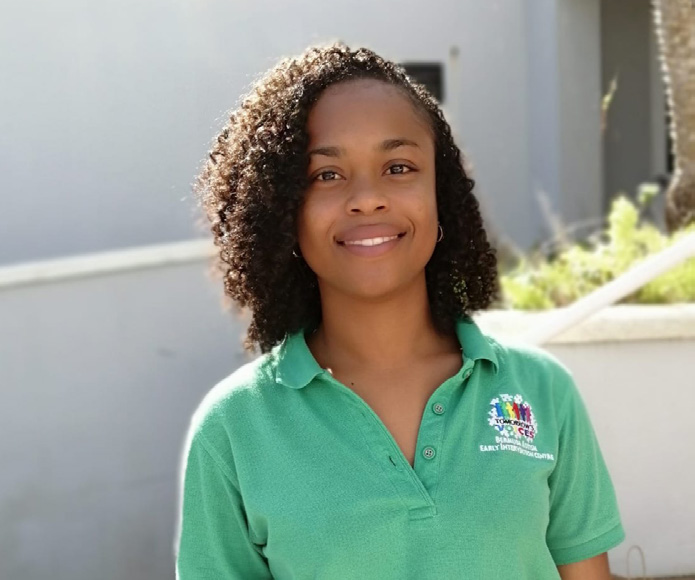(In photo: Dr Jahnae Harvey, senior verbal behaviour therapist at Tomorrow’s Voices)
Feature by: VICKI ABRAHAM
Autism is a developmental disability, also known as an ‘invisible’ disability. When a person enters a room, you likely wouldn’t know they have autism. It’s not visible.
Developmental disability relates to the gap in a person’s chronological age (age from birth) to their developmental age, where they may perform or respond with differences in social skills, communication skills and sensory processing.
It’s most common for autism to be diagnosed in children and can be detected as young as two years old, however some adults are diagnosed if they self-identify symptoms. Women and girls are less likely to be diagnosed because autism appears differently for them. Females tend to mask the characteristics and are more likely to become emotionally exhausted, likely from the masking.
THE ‘SPECTRUM’
One in 44 people are diagnosed with autism according to US organisation, Autism Speaks. This high ratio includes a wide range of varying degrees of autism. That range is referred to as the ‘spectrum’ and includes people who are more impacted by their diagnosis and need continuous care, as well as people who are extremely high functioning.
Several world leaders and visionaries reportedly have high functioning autism, including Elon Musk and Albert Einstein. People on the autism spectrum can show extreme interest in trains, science, planets or maths for instance, and are intellectually sharp. They’re cognitively higher functioning and spend most of their time on their subject of interest, and will flourish, to the exclusion of other things. They may have difficulty with less literal subjects such as creative arts and everyday social skills. Asperger’s Syndrome, as it was once known, is on the autism spectrum.
What can be done to treat autism?
There is no cure. Early detection and diagnosis are key to improving behavioural development.
Tomorrow’s Voices is Bermuda’s primary charity and provider for people with autism and other developmental disabilities. It is recognised by overseas medical diagnostic centres as Bermuda’s provider of applied behaviour analysis.
Dr Jahnae Harvey is Tomorrow’s Voices’ senior verbal behaviour therapist. She explained: “We do a full-scale assessment of skills for learners. We don’t diagnose but we assess what skills a learner has, and we identify what’s missing so we can help build a solid foundation. We always want to identify their strengths to encourage a mix of interactions. There are times that tasks are difficult for clients, however we ensure to mix in easy skills. We tap into a child or adult’s motivation and use positive reinforcement. Everything we do is led by the individual and that will determine what skills we’ll teach.”
Is my child at risk?
Parents and educators can check for early tell-tale signs in a child, such as lack of eye contact, delayed speech, a child who once engaged in speech is no longer speaking, or gestures like hand flapping or rocking. A paediatrician can make an initial assessment of whether a child is at their developmental age and if needed they might refer the child for a diagnosis, sometimes overseas at Boston Children’s Hospital, Kennedy Krieger’s Centre for Autism in Baltimore, or Nemours Children’s Hospital in Delaware.
The diagnosis doesn’t involve any physical test, rather it is a behavioural assessment with a questionnaire, observation and direct questioning of the patient.
There is no known cause of Autism despite a large body of research on the topic. Some research points to hereditary traits, others indicate it’s an outcome of later-age births, but it is not definitive.
What family and educational support is available?
Tomorrow’s Voices offers a range of programmes to support people with autism and developmental disabilities, and participants do not need to be diagnosed to benefit.
Dr Harvey said: “We cater to individuals who may demonstrate characteristics or may be pursuing a diagnostic assessment. Living in Bermuda, not everyone has successfully obtained a diagnosis, we do an observation of the behaviours and see how and where we can help.
So, for us, we meet the learner where they are. There are so many people who can benefit and especially in the more casual and open Saturday drop-in Social Skills Programme, it’s open to anyone who is interested.”
Programmes available at Tomorrow’s Voices include:
Social Skills Programme: This drop-in programme meets every second and fourth Saturday. Learners work on areas including social skills, taking turns and flexible play.
Summer Programme: This is like a summer camp for those aged two to 21 years old.
Thriving Beyond 21 Programme: 1:1 and 1:3 learner-teacher ratios to ensure that all clients have the success that they need.
Bi-monthly workshops and training for educators and caregivers.
One-on-one clinical programme – Tomorrow’s Voices year-round programme.
Who can I talk to?
Tomorrow’s Voices is a charity that has supported people with developmental disabilities for 15 years and it’s growing. There are several useful videos on their social media, @tomorrowsvoices, and website: www.tomorrowsvoices.bm, with information about the programmes they offer. Their email is: [email protected]
Dr Harvey invites parents to call the office on 297-4342. “We’re here, we’re a resource. Call us, as some programmes are tailored to suit the needs of the learner.”
Tomorrow’s Voices is currently in a temporary location at T.N. Tatem, 60 Middle Road, Warwick after outgrowing their previous facility and the charity is actively seeking a permanent space, with the help of the community

